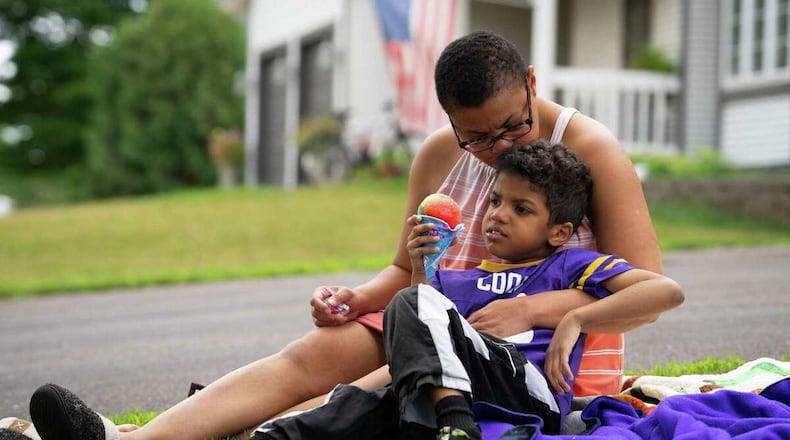Brundidge has four children, and three are on the spectrum. Her oldest, Andrew, 18, does not have autism.
Credit: Provided
Credit: Provided
Her son Daniel, 10, consistently tried to get out of the house and was drawn to water. Added hotel locks and alarm systems did not prevent him from wandering.
Because some kids with autism can’t talk, understand simple commands or make eye contact, it’s almost impossible to teach them to swim, according to Brundidge.
“It was a daily chore just to keep my son safe during the ‘drowning season’ from running out of the house and hopping in a lake,” she said.
Finally, she found something that worked: Interior combination locks —which are $40 on Amazon — and installed them on each of the doors in her home that led outside. The electronic locks require a 6-10 digit code to open.
“That stopped my son from wandering and rewired his brain so that even if we’re at the grocery store or at church or visiting family, he doesn’t try to escape anymore,” she said.
She has now used the locks for about three years, and there have been no more incidents of Daniel getting out of the house.
“It’s the only reason my child is still alive,” she said.
Brundidge started a campaign called “Spread Love with Locks,” where she has traveled to nine different cities across the county and given away door locks to parents who want or can’t afford them. She has donated 800-900 locks, the majority of which she bought with her own money.
“I’m just a momma with a mouth on a mission to help other parents. I don’t want another mother to have to bury her child,” she said.
To those who might criticize a parent of a child with autism who wanders, Brundidge said, “If you don’t have a child with autism, you don’t understand.”
“These parents who have kids with special needs...they need grace,” she said.
She plans on visiting Butler County to spread awareness of the locks.
On Friday, June 14, 7-year-old Mardasia Forte, an autistic child, was found in a retention pond in the 6600 block of Lakeside Drive in West Chester Twp.
Though officers arrived within minutes and began life-saving efforts, Forte was pronounced dead at the scene.
In November, 6-year-old Joshua Al-Lateef Jr., an autistic child, went missing from his West Chester Twp. at the Lakefront apartments, and was found 28 hours later in a retention pond on Wyndtree Drive. There are several ponds within the 30-plus-building complex.
Retention ponds, or wet basins, are one of two ways a developer manages stormwater on a property. These types of ponds retain stormwater runoff, the aesthetic option over a detention pond or a detention basin, which temporarily retains stormwater. They are also not for recreational use.
There are no uniform fencing requirements in Butler County for retention ponds, unlike the rules for pools.
Bodies of water, like ponds, do attract people, but those with autism they “often exhibit a strong fascination and attraction to water that goes beyond what the rest of us may experience,” according to report on the Autism Society of Florida.
A Cincinnati organization wants to make sure children, especially those with autism, are protected from retention ponds and basins near their homes.
Leslie Williams, board president for EmPath for Autism, said the organization she co-founded is drafting legislation and will shop it to lawmakers that would require fencing to be installed around these man-made bodies of water in neighborhoods and apartment complexes.
This would be a huge undertaking for communities with new subdivisions in counties like Warren and Butler that use retentions ponds in new development.
“Anytime a body of water is easily accessible to children, I think we need to think a little bit further about that as a community. I feel as parents and the community in general, we have a moral obligation to try to keep children safe,” she said, a co-founder of EmPath for Autism, a 501c3 created as a resource for children and families affected by Autism Spectrum Disorder.
The bill wouldn’t be for all bodies of water, Williams said; instead, the bill just looks at ones that are near residences, a school or a playground. It’s about “starting small” and “making small changes fast.”
Williams has reached out to some lawmakers to discuss the issue, and plans to contact more to “have some sort of safeguard around these detention ponds, so this doesn’t happen anymore, is all we’re looking for,” Williams said.



